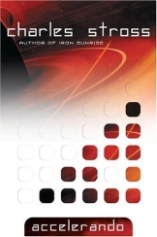
Accelerando
Charlie Stross
390 pages
published in 2005
Read more about:
Charles Stross,
Accelerando,
science fiction,
book review
As you may know from my reviews of Singularity Sky and Iron Sunrise, I rate Charlie Stross' work quite highly. Accelerando is no exception. In many ways it is his most ambitious work to date: it was written as a series of nine short stories designed to be merged into a novel later, intended to break into the American science fiction scene and most importantly, it was to take the dreaded singularity head on, a prospect even its inventor, Vernor Vinge chose to avoid. The singularity being that point in human development where various technological developments converge in such a way to move us from human to post-human and the point from whereon it is no longer possible to predict or even guess at what will happen next. To a certain kind of science fiction fan, it has taken on semi-religious significance; not for nought did Ken MacLeod call it "the Rapture for nerds". Not only is the Singularity an article of faith with these fans, not just a neat science fiction concept, but it is also supposed to be impossible to write about what it would be like to live through, but Stross has taken that challenge here. I don't think he entirely succeeded in this challenge, but he made a good attempt of it.
He does it by making this a generational story, the first three stories being about Manfred Macx, legendary hacker/idea man, the embodiement of open source in that he gives away his ideas and gets recompensated in kind (free airfare, hotels, bheer, etc) before moving on to his daughter Amber, who is far more radical than her father ever was, motivated by a desire to get away from her oldfashioned and overbearing mother. She goes as far as joing the first interstellar expedition leaving the Solar System, in a spaceship the size of a coke can. It's with Amber's adventures that we go from still plausible if ever more outrageous near future science fiction into full blown Singularitismus, though there is never a single point which you can point at as the Singularity. Something the characters in the story at one point debate as well: has the singularity already happened, is it happening now or has it yet to happen. Note that at this point in time all characters are uploaded post-humans in a cyberspace replica of the brown pub Manfred Macx visited in Amsterdam in the first story in the computer memory of "a coke-can-sized slab of nanocomputers" on its way to the stars...
The trouble is that while the near-future technobabble starts out plausible (and is in fact, not much more than an extrapolation of current New Scientist articles mashed up with the ideas in some of the weirder technoblogs), the more advanced the technology described becomes, the more it succombs to Clarke's third law: "Any sufficiently advanced technology is indistinguishable from magic", in which only the incantations differ from those in fantasy novels. The last third or so of the novel suffers the most from this and it became difficult for me to stay interested in the plot because of it.
As said, this is a fixup of nine short stories written and published between 2001 and 2004, in Asimov's Science Fiction, as part of Stross' strategy to break into the US science fiction market. This strategy worked very well: several of the short stories got nominated for Hugo Awards, as well as republished in the annual Gardner Dozois' Year's Best Science Fiction series. The original short stories in effect sponsoring the novel. Of course, this approach has its disadvantages as well; no fixup is ever as coherent as a true novel, though this is partly negated here by the episodic nature of Accelerando. More importantly, the simple fact that these stories have been written over the course of at least five years has added its own challenges. I got the impression that Stross was a bit bored with it at the end of the book, that some of the themes of transhumanism and the Singularity were not as interesting to him anymore than they were at the start of this project. Not to mention that the world has changed a lot in the years between "Lobsters", the first story and "Survivor", the last. Even in 2001 there was still something of the optimism of the late nineties, the promise that the internet would set us all free; now all this looks not just naive, but actively malicious. Not only that, but the delay between first publication of "Lobsters" and the publication of Accelerando means that the former already looks dated, even though at the time it was mindblowing. The ideas in it have been used by others since and do not have that feeling of sensawunda that they had the first time I read "Lobsters".
Nevertheless, Accelerando is still worth reading; Stross has more ideas than any science fiction writer since Bruce Sterling and like Sterling, he is also able to write well about them, a skill that's still rare in his brand of science fiction. Accelerando is still required reading if you want to see the future of science fiction.
